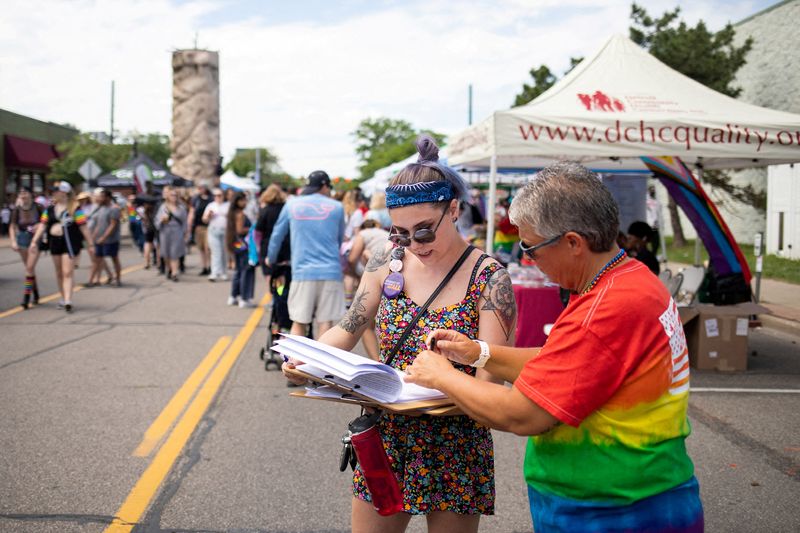By James Oliphant
ST. CLAIR SHORES, Mich (Reuters) - The latest front in the U.S. war over abortion was waged last week during an idyllic summer evening on Michigan's lakeshore.
Outside a park where kids ate waffle cones and hundreds of people listened to a concert in the band shell, volunteers collected signatures in support of placing a measure on the November ballot that would amend the state's constitution to safeguard abortion rights.
Their task took on new urgency after the U.S. Supreme Court on June 24 overturned the landmark 1973 Roe v. Wade ruling that had legalized abortion nationwide and left the issue to individual states to regulate.
In Michigan, where opinion polls show the majority of people support abortion rights, Democratic Governor Gretchen Whitmer filed a lawsuit to invalidate a 1931 state law that makes abortions a felony and establish a state constitutional right to abortion. A court has temporarily blocked that law from being enforced, but the Republicans who control the state legislature want to keep the ban on the books or enact a new one.
Political tensions in Michigan over the future of abortion could be a harbinger of what may play out in a handful of other U.S. states with a similar dynamic - an electorate that favors abortion rights governed by a legislature determined to restrict them.
Whitmer has made protecting abortion rights a centerpiece of her re-election campaign this year, saying she can veto any attempt by the legislature to pass a new ban.
"This could very quickly go from a state where abortion is safe and legal to one that makes it illegal with no exceptions," Whitmer said in an interview on Friday. "That's a very real threat."
Whitmer said she would promote the ballot measure if her own efforts to legalize abortion fail in the courts.
The coalition of abortion-rights and progressive groups behind the petition drive face a July 11 deadline to amass about 425,000 signatures to qualify for the ballot. As she gathered signatures outside the park in St. Clair Shores last week, volunteer Deborah Karcher, 46, said direct action is the best way to save reproductive rights.
"This is the will of the people," Karcher said. "Even if you don't agree with this, let's get it on the ballot. Let the people decide."
Opponents of the ballot measure, including religious and anti-abortion groups, also have mobilized, saying the language of the amendment would open the door to late-term abortions and block parental notification when minors seek the procedure.
STATE FIGHTS
Outside Michigan, a voter backlash over abortion restrictions could figure in elections in other states including Arizona, Georgia, North Carolina, Pennsylvania and Wisconsin, which all have either a competitive governor's or U.S. Senate race this year.
Louis Jacobson, a political analyst at the University of Virginia Center for Politics, said these states are "where the rubber will really hit the road on this issue."
With President Joe Biden and his Democratic Party under fire from critics on matters such as inflation and crime, abortion "is the first potential issue that could boost the Democrats rather than hurt them," Jacobson said.
Whitmer is counting on that. The governor's first term was rocked by criticism from the right over the state's COVID-19 restrictions on businesses and schools. But recent polls have shown that more voters approve of her performance in office than Biden's.
Whitmer said she was raised by a Republican father who supported abortion rights, and she hopes to reach out to Republicans and independents who share those views.
"We know 70% of the people in our state support a woman being able to make her own healthcare decisions and abortion being an option," Whitmer said. "That means it crosses party lines."
Whitmer's Republican challengers, who will square off in an Aug. 2 primary, all support a ban on abortion and oppose the ballot measure.
National Democrats have placed Michigan on the short list of states where they believe they can shift the balance of power in the state legislature as part of what the party calls its "States to Save Roe" campaign.
The Democratic Legislative Campaign Committee, the arm of the party that supports candidates for state legislatures, has said it is raising money to provide strategic planning and voter data analysis to support races in states such as Michigan and Pennsylvania.
Donations to the committee have jumped three-fold since Roe was overturned, according to Gabrielle Chew, a spokesperson for the group, although she could not provide specific figures.
CONSTITUTIONAL PROTECTIONS
According to the Center for Reproductive Rights advocacy group, courts in 11 states have ruled that their state constitutions protect abortion rights. Court challenges in other states such as Florida are ongoing.
The proposed amendment to Michigan's constitution would establish a right to "reproductive freedom" and would apply to decisions about fertility treatments and contraception as well as abortion. Opponents of the ballot measure have called the language of the amendment overly broad.
The opposition coalition has been trying to appeal to moderate supporters of abortion rights, along with those who oppose abortion, to convince them to not support the ballot measure, said spokesperson Christen Pollo.
"Even if you are pro-choice, even if you support abortion, you should reject this abortion amendment," Pollo said. "A majority of Michiganders do not support unregulated abortion."

Nicole Wells Stallworth, executive director of Planned Parenthood Advocates of Michigan, noted that the amendment would allow the legislature to regulate abortions after fetal viability - the original standard set by Roe.
"This constitutional amendment would create a broad safety net for people wanting to own their own bodily autonomy as it relates to their reproductive rights and their reproductive freedoms," Wells Stallworth said. "This measure is something that benefits all people."